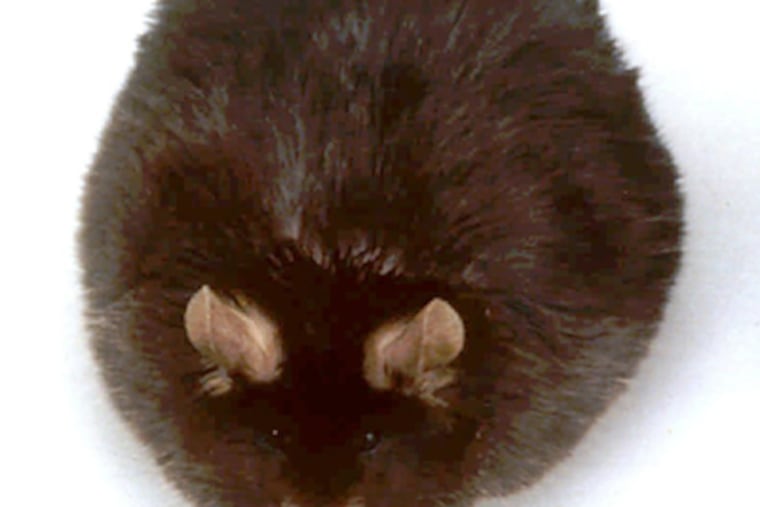Study of link between night eating and the peculiar internal clock of fat cells
When researchers at the University of Pennsylvania messed with the internal clocks of mouse fat cells, a surprising thing happened.

When researchers at the University of Pennsylvania messed with the internal clocks of mouse fat cells, a surprising thing happened.
The mice got fat.
Figuring out why led to more surprises. Mice usually eat at night, but the altered mice ate more of their food during the day. They got fat even though they ate the same number of calories as regular, nocturnal-feeding mice.
And when the researchers gave altered mice two of the key ingredients in fish oil, the animals didn't get fat.
That's a lot to digest, but it has potential implications for humans as we enter the season of stuffed refrigerators that beckon some to eat when they should be resting.
"One message from our paper is, 'Don't raid the larder at night,' " said Garret FitzGerald, director of the Institute for Translational Medicine and Therapeutics at Penn's Perelman School of Medicine. Lead author Georgios Paschos is a research associate in the lab.
The behavior change in mice immediately reminded FitzGerald of human night-eating syndrome, a condition associated with obesity that was first described in 1955 by Penn obesity expert Albert Stunkard. About 1.5 percent of the population has it. FitzGerald's group is now working with the Penn center that treats night eaters, the Center for Weight and Eating Disorders, to set up a study of whether people with the condition share metabolic or genetic traits with the day-eating mice.
Previous research also has shown that night-shift workers and people with sleep disorders are more likely to be obese.
Even so, Gary D. Foster, director of Temple University's Center for Obesity Research and Education, doubts the mice results can be extrapolated to human obesity treatment. What he found intriguing was the power of fat cells to change the animals' metabolism.
"I think this confirms what people have talked about for the past few decades: that fat is metabolically active," Foster said. "It's not just an inert storage tissue. If you can get mice to gain weight consuming the same number of calories, that turns conventional wisdom upside down."
FitzGerald's new line of research, published this month in Nature Medicine, is just a taste of how thoroughly animal bodies are attuned to the daily rotation of the Earth, even at the cellular level.
This circadian regulation has long interested doctors, who noticed that certain conditions such as asthma, depression, heart attacks, and stroke varied with the time of day, FitzGerald said. Our bodies metabolize medicines differently at different times as well.
That may be partly because environmental factors change during the day, but scientists also learned decades ago that our brains house a "master clock." Then they learned that some genes functioned differently at different times of the day and that tissues of all types contained their own little clocks. Those peripheral clocks were thought to be "slave oscillators" that did as the master clock commanded.
FitzGerald's group, which is "interested in the role of these peripheral clocks in cardiovascular function and metabolism," decided to see what would happen if they knocked out the clock gene in mouse fat cells.
The mice shifted 20 percent of their consumption into what should have been their rest period, and they became obese.
The study also provided evidence that the peripheral clock was more powerful than previously thought. When it was knocked out in the fat cells, the genes that normally would tell you when to eat and when not to eat became disordered.
A few other genes that govern how unsaturated fatty acids involved in food intake - EPA and DHA - are released in the blood were also disrupted. Levels of EPA and DHA, key ingredients in fish oil, were low during daytime feeding.
With supplementary EPA and DHA, the scientists were able to prevent the weight gain.
FitzGerald sidestepped the two most obvious questions: Should obese people start taking fish oil, and at what time of night should people stop eating?
He did say, though, that he thought our circadian clocks were key "because we need a period of quiescence to recharge our metabolic batteries. . . . I think we're meant to rest at night and not be eating."
For scientists, he said, it's important to start with the most serious problem - those who get up to eat - and then see whether lessons from them are applicable to broader groups.
Kelly Allison, an assistant professor at Penn's Center for Weight and Eating Disorders, said she was intrigued by the first animal model of night eating. In humans, someone is said to have night-eating syndrome if he eats at least 25 percent of his food after dinner or wakes up at least twice a week to eat.
She's used to the question about when to stop eating and also didn't answer it. "I don't ever pick a time out of the hat, like after-8 eating is evil," she said. Still, she said, animal studies have been suggesting that we don't make as efficient use of energy consumed at night.
Isn't it time to do a study that will answer the questions?
"We are on it," she said. "We're thinking about how we can do it."